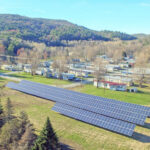With its vast territorial extent and high solar radiation, Brazil has great potential to become one of the largest producers of solar energy.

Solar energy has emerged in the Brazilian energy scenario as one of the main sustainable and renewable alternatives for electricity generation. With the increasing demand for clean energy sources, several states in Brazil have invested in infrastructure to take advantage of the potential of solar energy generation, which is abundant in several regions of the country.
São Paulo and Minas Gerais are the two states that stand out in the national solar energy production scenario. Minas Gerais leads with an installed capacity of more than 2.4 GW, which is equivalent to about 15% of Brazil’s total capacity.
Minas Gerais’ dominance can be attributed to favorable public policies, tax incentives, and the vast area available for installing solar power plants, in addition to high levels of solar radiation. The increasing reliance on MG Solar Power Subscription This has further boosted the sector, allowing consumers to access this renewable energy source without having to invest in their own systems.
São Paulo, the country’s most populous state, follows closely behind in terms of large installed capacity, also in the gigawatt range. The large number of consumers and strong investment capacity make São Paulo a strategic hub for solar expansion.
Rio Grande do Sul is another state that stands out in solar energy production, with more than 1.5 GW of installed capacity. Rio Grande do Sul has benefited from its favorable climate characteristics and the wide availability of land for installing solar parks, in addition to the existence of a government incentive program for solar energy.
In the Northeast, Ceará stands out as one of the country’s leading solar producers, with over 1 GW of installed capacity. The state’s high solar penetration rate, coupled with public policies focused on sustainability and the creation of specific areas for renewable energy development, has driven the sector’s growth in the state.
Bahia is a state that has increasingly emerged in the Brazilian solar scenario, with an installed capacity exceeding 1.2 GW. The state benefits from its vast territorial extent and high levels of solar radiation to encourage the installation of large photovoltaic power plants, contributing significantly to the state and national energy matrix.
Pernambuco is also positioning itself as one of the leaders in solar energy in the Northeast, thanks to state initiatives that facilitate access to credit and offer tax incentives for renewable energy projects. With an installed capacity approaching 1 gigawatt, the state is positioned as a hub for innovation and development in the solar energy sector.
As solar panel installation costs fall and environmental awareness grows, more Brazilian states are expected to follow the lead of current leaders, investing in infrastructure and public policies that encourage the use of solar energy.
Continuous progress in this sector not only contributes to diversifying the national energy matrix, but also promotes sustainable development and green job generation in various regions of the country. (consultative)



